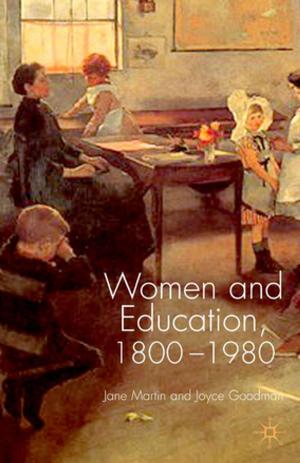Chaucer's Language
Fiction & Literature, Literary Theory & Criticism, Medieval, Nonfiction, Reference & Language, Language Arts, Translating & Interpreting| Author: | Professor Simon Horobin | ISBN: | 9781137274588 |
| Publisher: | Palgrave Macmillan | Publication: | October 18, 2012 |
| Imprint: | Palgrave Macmillan | Language: | English |
| Author: | Professor Simon Horobin |
| ISBN: | 9781137274588 |
| Publisher: | Palgrave Macmillan |
| Publication: | October 18, 2012 |
| Imprint: | Palgrave Macmillan |
| Language: | English |
The English language has changed dramatically over the past 500 years, making it increasingly difficult for students to read Chaucer's works. Assuming no previous linguistic knowledge or familiarity with Middle English, Simon Horobin introduces students to Chaucer's language and the importance of reading Chaucer in the original, rather than modern translation.
Chaucer's Language
- leads the reader gently through basic linguistic concepts with appropriate explanation
- highlights how Chaucer's English differs from present-day English, and the significance of this for interpreting and understanding his work
- provides close analysis and comparison with the writings of Chaucer's contemporaries to show how Chaucer drew on the variety of Middle English to achieve particular poetic effects
- includes sample texts, a glossary of linguistic terminology, a bibliography and suggestions for further reading to aid study.
Authoritative and easy-to-follow, this is an indispensable guide to understanding, appreciating and enjoying the language of Chaucer.
Chaucer's Language
- leads the reader gently through basic linguistic concepts with appropriate explanation
- highlights how Chaucer's English differs from present-day English, and the significance of this for interpreting and understanding his work
- provides close analysis and comparison with the writings of Chaucer's contemporaries to show how Chaucer drew on the variety of Middle English to achieve particular poetic effects
- includes sample texts, a glossary of linguistic terminology, a bibliography and suggestions for further reading to aid study.
Authoritative and easy-to-follow, this is an indispensable guide to understanding, appreciating and enjoying the language of Chaucer.
The English language has changed dramatically over the past 500 years, making it increasingly difficult for students to read Chaucer's works. Assuming no previous linguistic knowledge or familiarity with Middle English, Simon Horobin introduces students to Chaucer's language and the importance of reading Chaucer in the original, rather than modern translation.
Chaucer's Language
- leads the reader gently through basic linguistic concepts with appropriate explanation
- highlights how Chaucer's English differs from present-day English, and the significance of this for interpreting and understanding his work
- provides close analysis and comparison with the writings of Chaucer's contemporaries to show how Chaucer drew on the variety of Middle English to achieve particular poetic effects
- includes sample texts, a glossary of linguistic terminology, a bibliography and suggestions for further reading to aid study.
Authoritative and easy-to-follow, this is an indispensable guide to understanding, appreciating and enjoying the language of Chaucer.
Chaucer's Language
- leads the reader gently through basic linguistic concepts with appropriate explanation
- highlights how Chaucer's English differs from present-day English, and the significance of this for interpreting and understanding his work
- provides close analysis and comparison with the writings of Chaucer's contemporaries to show how Chaucer drew on the variety of Middle English to achieve particular poetic effects
- includes sample texts, a glossary of linguistic terminology, a bibliography and suggestions for further reading to aid study.
Authoritative and easy-to-follow, this is an indispensable guide to understanding, appreciating and enjoying the language of Chaucer.















